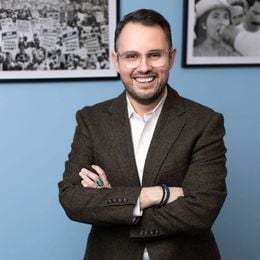Ask the Expert: What's Different About Being an Alzheimer's Caregiver?
It's Alzheimer's Awareness Month. And our caregiving expert, Jason Resendez, highlights the unique challenges of dementia caregivers.
With November being National Family Caregivers Month and Alzheimer's Awareness Month, it's no surprise that readers are thinking about the intersection of dementia and family caregiving. One reader asked, "What, from your experience, have you noticed to be unique about and specific to the experience of caring for a dementia patient?"

There are more than 11 million Americans providing dementia related care in the U.S., so this is an important opportunity to put a spotlight on this growing community. I asked National Alliance for Caregiving board member, Home Instead gerontologist, and nationally recognized care expert Lakelyn Eichenberger (LE) for her thoughts on this critical question. The following is an excerpt from our conversation.
JR: You have deep experience in this area of care, what are some of the unique experiences that come to mind?
LE: Caring for those living with dementia presents unique challenges compared to other caregiving experiences due to a variety of reasons. While there are different types of dementia, with Alzheimer's disease being the most common type, they are progressive in nature, requiring more care and assistance for the individual over time. This additional support often falls to family caregivers and can take place over a long period of time — years or even decades. When you compare dementia caregivers to non-dementia caregivers, research finds that dementia caregivers often provide more care and have higher levels of stress, strain and burden.
JR: And isn't it a challenge to get an accurate and timely dementia diagnosis? How does this impact caregivers?
LE: Navigating the health care system can be challenging for all family caregivers; however, for those living with dementia it may take months or even years to receive a diagnosis. Dementia caregiving also often involves interacting with various health care professionals and services. Navigating the complex health care system, coordinating appointments, and managing medications can be demanding for caregivers.
JR: What about the behavioral challenges that family caregivers navigate with their loved ones?
LE: Dementia can lead to unpredictable and sometimes challenging behaviors related to their dementia. The symptoms and behavioral changes may vary by the individual and by the type of dementia. They may include anxiety, agitation, wandering or aggression. It can be helpful for caregivers to adapt their approach and strategies to manage these dementia-related behaviors effectively.
JR: One of our mutual friends, the journalist Meryl Comer, wrote beautifully about caring for her husband for more than 20 years. Does the sometimes long-term nature of dementia care pose unique challenges?
LE: Caregivers may find themselves in the role for an extended period. For Alzheimer's disease, studies indicate that people 65+ live an average of four to eight years after a diagnosis and some live as long as 20 years. The dementia caregiving journey can often feel like a marathon requiring sustained patience, adaptability and support.
As our conversation highlights, it's important to note that everyone's experience with dementia is unique, and therefore, the challenges faced by caregivers can vary widely. Support networks, education about dementia, and access to resources can significantly impact the caregiving experience. It is so important for dementia caregivers to seek assistance such as disease specific resources, support groups and respite care.
Have a caregiving question? Ask the expert here.


